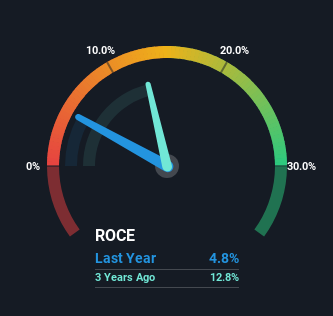Zhejiang Yonghe Refrigerant (SHSE:605020) Will Be Hoping To Turn Its Returns On Capital Around
What trends should we look for it we want to identify stocks that can multiply in value over the long term? Amongst other things, we'll want to see two things; firstly, a growing return on capital employed (ROCE) and secondly, an expansion in the company's amount of capital employed. Ultimately, this demonstrates that it's a business that is reinvesting profits at increasing rates of return. However, after investigating Zhejiang Yonghe Refrigerant (SHSE:605020), we don't think it's current trends fit the mold of a multi-bagger.
Return On Capital Employed (ROCE): What Is It?
Just to clarify if you're unsure, ROCE is a metric for evaluating how much pre-tax income (in percentage terms) a company earns on the capital invested in its business. Analysts use this formula to calculate it for Zhejiang Yonghe Refrigerant:
Return on Capital Employed = Earnings Before Interest and Tax (EBIT) ÷ (Total Assets - Current Liabilities)
0.048 = CN¥210m ÷ (CN¥7.2b - CN¥2.9b) (Based on the trailing twelve months to June 2024).
Therefore, Zhejiang Yonghe Refrigerant has an ROCE of 4.8%. On its own that's a low return on capital but it's in line with the industry's average returns of 5.5%.
Check out our latest analysis for Zhejiang Yonghe Refrigerant

Above you can see how the current ROCE for Zhejiang Yonghe Refrigerant compares to its prior returns on capital, but there's only so much you can tell from the past. If you'd like to see what analysts are forecasting going forward, you should check out our free analyst report for Zhejiang Yonghe Refrigerant .
What Does the ROCE Trend For Zhejiang Yonghe Refrigerant Tell Us?
On the surface, the trend of ROCE at Zhejiang Yonghe Refrigerant doesn't inspire confidence. Over the last five years, returns on capital have decreased to 4.8% from 14% five years ago. On the other hand, the company has been employing more capital without a corresponding improvement in sales in the last year, which could suggest these investments are longer term plays. It's worth keeping an eye on the company's earnings from here on to see if these investments do end up contributing to the bottom line.
On a related note, Zhejiang Yonghe Refrigerant has decreased its current liabilities to 40% of total assets. That could partly explain why the ROCE has dropped. Effectively this means their suppliers or short-term creditors are funding less of the business, which reduces some elements of risk. Since the business is basically funding more of its operations with it's own money, you could argue this has made the business less efficient at generating ROCE.
What We Can Learn From Zhejiang Yonghe Refrigerant's ROCE
In summary, Zhejiang Yonghe Refrigerant is reinvesting funds back into the business for growth but unfortunately it looks like sales haven't increased much just yet. Since the stock has declined 30% over the last three years, investors may not be too optimistic on this trend improving either. All in all, the inherent trends aren't typical of multi-baggers, so if that's what you're after, we think you might have more luck elsewhere.
Since virtually every company faces some risks, it's worth knowing what they are, and we've spotted 4 warning signs for Zhejiang Yonghe Refrigerant (of which 1 is a bit unpleasant!) that you should know about.
If you want to search for solid companies with great earnings, check out this free list of companies with good balance sheets and impressive returns on equity.
Valuation is complex, but we're here to simplify it.
Discover if Zhejiang Yonghe Refrigerant might be undervalued or overvalued with our detailed analysis, featuring fair value estimates, potential risks, dividends, insider trades, and its financial condition.
Access Free AnalysisHave feedback on this article? Concerned about the content? Get in touch with us directly. Alternatively, email editorial-team (at) simplywallst.com.
This article by Simply Wall St is general in nature. We provide commentary based on historical data and analyst forecasts only using an unbiased methodology and our articles are not intended to be financial advice. It does not constitute a recommendation to buy or sell any stock, and does not take account of your objectives, or your financial situation. We aim to bring you long-term focused analysis driven by fundamental data. Note that our analysis may not factor in the latest price-sensitive company announcements or qualitative material. Simply Wall St has no position in any stocks mentioned.
About SHSE:605020
Zhejiang Yonghe Refrigerant
Engages in research and development, production, and sale of fluorine chemical products.
Flawless balance sheet with solid track record.
Market Insights
Community Narratives



